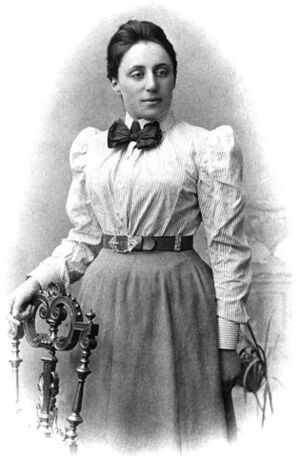Emmy Noether (nonfiction): Difference between revisions
No edit summary |
No edit summary |
||
| Line 1: | Line 1: | ||
[[File:Emmy_Noether.jpg|thumb|Emmy Noether.]]'''Amalie Emmy Noether''' (23 March 1882 – 14 April 1935) was a German [[Mathematician (nonfiction)|mathematician]] known for her landmark contributions to abstract algebra and theoretical physics. | [[File:Emmy_Noether.jpg|thumb|Emmy Noether.]]'''Amalie Emmy Noether''' (23 March 1882 – 14 April 1935) was a German [[Mathematician (nonfiction)|mathematician]] known for her landmark contributions to abstract algebra and theoretical physics. | ||
As one of the leading mathematicians of her time, she developed the theories of rings, fields, and algebras. | As one of the leading mathematicians of her time, she developed the theories of rings, fields, and algebras. | ||
In physics, Noether's theorem explains the connection between symmetry and conservation laws. | In physics, Noether's theorem explains the connection between symmetry and conservation laws. | ||
Noether's work in abstract algebra and topology was influential in mathematics, while in physics, Noether's theorem has far-ranging consequences for theoretical physics and dynamic systems. She showed an acute propensity for abstract thought, which allowed her to approach problems of mathematics in fresh and original ways. | |||
Her friend and colleague [[Hermann Weyl (nonfiction)|Hermann Weyl]] described her scholarly output in three epochs: | |||
<blockquote> | |||
(1) the period of relative dependence, 1907–1919; | |||
(2) the investigations grouped around the general theory of ideals 1920–1926; | |||
(3) the study of the non-commutative algebras, their representations by linear transformations, and their application to the study of commutative number fields and their arithmetics. | |||
</blockquote> | |||
== In the News == | == In the News == | ||
| Line 17: | Line 25: | ||
* [[Mathematics (nonfiction)]] | * [[Mathematics (nonfiction)]] | ||
* [[Physics (nonfiction)]] | |||
External links: | External links: | ||
| Line 25: | Line 34: | ||
[[Category:Mathematicians (nonfiction)]] | [[Category:Mathematicians (nonfiction)]] | ||
[[Category:People (nonfiction)]] | [[Category:People (nonfiction)]] | ||
[[Category:Physicists (nonfiction)]] | |||
Revision as of 09:00, 4 February 2017
Amalie Emmy Noether (23 March 1882 – 14 April 1935) was a German mathematician known for her landmark contributions to abstract algebra and theoretical physics.
As one of the leading mathematicians of her time, she developed the theories of rings, fields, and algebras.
In physics, Noether's theorem explains the connection between symmetry and conservation laws.
Noether's work in abstract algebra and topology was influential in mathematics, while in physics, Noether's theorem has far-ranging consequences for theoretical physics and dynamic systems. She showed an acute propensity for abstract thought, which allowed her to approach problems of mathematics in fresh and original ways.
Her friend and colleague Hermann Weyl described her scholarly output in three epochs:
(1) the period of relative dependence, 1907–1919; (2) the investigations grouped around the general theory of ideals 1920–1926; (3) the study of the non-commutative algebras, their representations by linear transformations, and their application to the study of commutative number fields and their arithmetics.
In the News
Fiction cross-reference
Nonfiction cross-reference
External links:
- Emmy Noether @ Wikipedia
